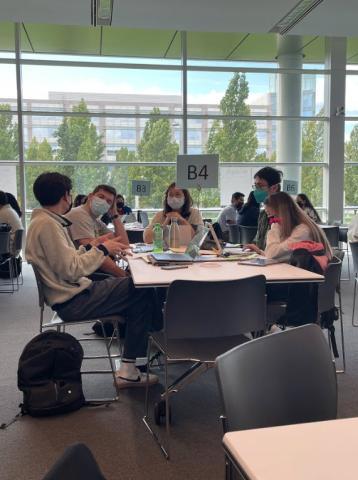At the heart of Case Western Reserve’s Collaborative Practice programming is a belief that communities and patients experience better outcomes when they work together.
The program includes two courses—Collaborative Practice I and Clinical Collaborative Practice—taught through the university’s Office of Interpersonal and Interdisciplinary Education and Research.
Collaborative Practice I, or CPI, is a service-learning, community-based experience that’s offered to entry level health profession and social work students. This one-year course teams students with community partners on mutually beneficial community-based projects to foster team building and interprofessional service-learning skills.
“In CPI, students learn interprofessional teamwork skills while collaborating with the community organization on a project that will help the organization fulfill their mission,” says Tyler Reimschisel, founding associate provost of interprofessional and interdisciplinary education and research and co-director of CPI with Dr. Jesse Honsky, assistant professor at the Frances Payne Bolton School of Nursing and assistant director of the Doctor of Nursing Practice Program. "The idea is that students have the time to learn the teamwork skills in the classroom and then practice them through their work on the community project.”
“We like to say that we learn about, from and with each other to impact health and patient outcomes,” Honsky says.
In CPI, students work on interprofessional teams on a project with a community partner that’s related to health and wellbeing. “We are intentionally broad about what these terms mean because we know that there are lots of different things that impact our health,” Honsky explains.
Each team comprises five to seven students who represent at least three of the following professions—nursing, medical, dental medicine, physician assistant, social work, genetic counseling, psychology and speech-language pathology. They are assigned to community organizations which include shelters, community development corporations, clinics, food banks and workforce development sites, among others. Each organization selects a community champion and that person serves as the students’ main point of contact at the organization.
Student teams then work with the community organization and their community champion throughout the academic year to complete a project that improves the health and well being of the region’s people and its communities. The students meet once a week to work on the project or to learn in classroom sessions that build their teamwork skills.
“We teach them how to communicate and how to give feedback in a team,” Honsky explains. “We also do a history of Cleveland session so that the students understand how the city’s history and past policies have impacted health outcomes and our partner organizations.”
Then, at the end of the academic year, students come together for the Collaborative Practice I Showcase to share the results of their work. Impressively, in 2021-22, 535 students on 93 student teams worked on 81 projects at 72 community partner organizations.
Building on the success of the program, later this year the Office of Interprofessional and Interdisciplinary Education and Research will begin Clinical Collaborative Practice (CCP).
CCP will build on CPI and offer advanced health professions students the opportunity to work on interprofessional, clinically-based projects and learn clinically-oriented teamwork skills while completing the requirements of their concurrent elective, rotation, practicum or other clinical experiences.
In CCP, advanced students from at least two different professions—including dental medicine, genetic counseling, medicine, nursing, nutrition, pharmacy, physician assistant, psychology, social work and speech-language pathology, among others—will work on small teams of two or five individuals. These students will be assigned to an inpatient, outpatient or combined inpatient/outpatient clinical service for at least one month. The duration of the assignment depends on the profession and program. In CCP, students will devote about one half-day each week to their projects.


